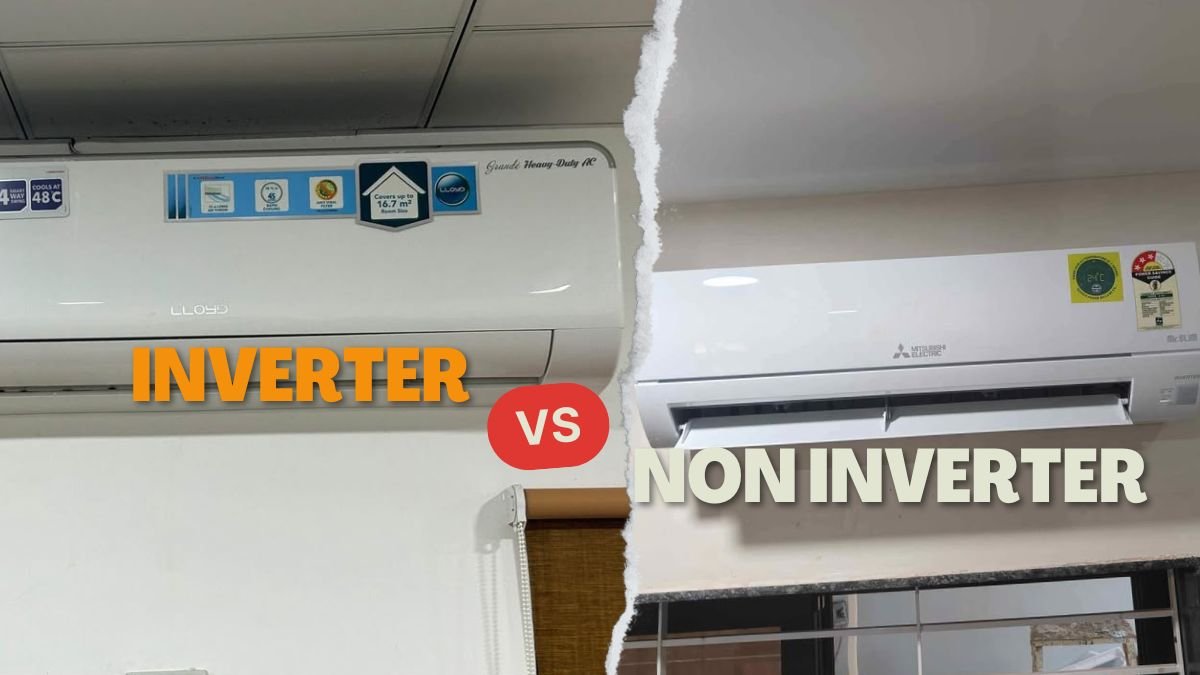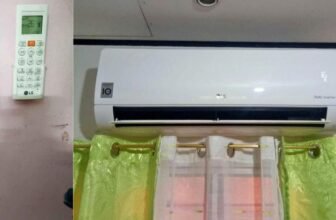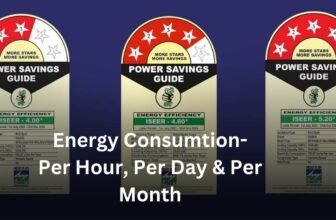
In just seven years, inverter air conditioners have revolutionized India’s cooling market, surging from less than 1% market share to a commanding 77% by 2023. This dramatic shift isn’t just about numbers – households using inverter ACs are cutting their energy consumption nearly in half, saving up to 44% on electricity bills compared to traditional units. As temperatures rise +0.44 °C above the 1981–2010 mean, when you going to choose between inverter and non-inverter AC, it becomes important to understand the basic difference between them.
Here, are some basic difference between them
Speed
The primary distinction between inverter and non-inverter air conditioners lies in their compressor operation. Inverter ACs utilize a variable-speed compressor that adjusts its speed based on the cooling demand. This allows for a smooth operation, maintaining a consistent temperature without frequent on-off cycles. In contrast, non-inverter ACs operate with a fixed-speed compressor, which runs at full capacity until the desired temperature is reached, then shuts off completely.
Key Comparisons
| Feature | Inverter AC | Non-Inverter AC |
|---|---|---|
| Compressor Speed | Variable | Fixed |
| Energy Efficiency | Up to 30% more efficient | Higher energy consumption |
| Temperature Control | Consistent | Fluctuating |
| Noise Level | Quieter due to smooth operation | Noisier due to cycling |
| Initial Cost | Higher | Lower |
Inverter ACs can save approximately 44% to 49% in energy usage compared to non-inverter models, leading to lower electricity bills over time. Each time a non-inverter unit starts its compressor, it draws significant power, causing spikes in energy consumption.
Moreover, inverter ACs are designed for longevity. They endure less wear and tear since they do not constantly turn on and off, unlike their non-inverter counterparts. While the upfront cost of inverter ACs is higher, their efficiency and durability make them a more economical choice in the long run.
Power Consumption
The power consumption difference between inverter and non-inverter air conditioners (ACs) is significant, impacting both energy bills and environmental sustainability.
Inverter ACs utilize a variable-speed compressor that adjusts its speed based on cooling demand. This design allows the compressor to run continuously at lower speeds once the desired temperature is reached, leading to smoother energy consumption. In contrast, non-inverter ACs operate with a fixed-speed compressor that frequently turns on and off, consuming more energy in the process.
Statistics reveal stark differences in energy usage. For instance, a study showed that a non-inverter AC consumes about 13.5 kWh daily during an 8-hour operation, while an inverter AC uses only 8.7 kWh, translating to approximately 35% energy savings (Source: researchgate.net). The following table summarizes the average annual energy consumption for different types of ACs:
Power Consumption: Inverter vs Non-Inverter AC
– Inverter ACs can save up to 44% in energy consumption
– Data based on average annual usage of 8 hours per day
– Actual savings may vary based on usage patterns and climate conditions
| Type of AC | Annual Energy Consumption (kWh) |
|---|---|
| Non-Inverter | 6230 |
| Inverter | 3471 |
This data indicates that inverter ACs can save up to 44% of electrical consumption compared to their non-inverter counterparts (Source: d-nb.info). Although inverter models typically have a higher upfront cost, their efficiency leads to long-term savings on electricity bills, making them a more economical choice over time.
Noise Level
Noise levels between inverter and non-inverter air conditioners (ACs) vary significantly due to their operational mechanisms.
Inverter ACs utilize a variable-speed compressor, which adjusts its speed according to the cooling demand. This leads to a smoother operation, producing noise levels typically between 30 to 50 dB during operation. In contrast, non-inverter ACs operate with a fixed-speed compressor that frequently turns on and off, resulting in abrupt noise spikes. These units can generate noise levels ranging from 50 to 70 dB, especially during start-up and shutdown phases. Here’s a comparative overview:
| Type of AC | Noise Level (dB) | Operation Mode |
|---|---|---|
| Inverter AC | 30 – 50 | Variable-speed compressor |
| Non-Inverter AC | 50 – 70 | Fixed-speed compressor |
The quieter operation of inverter ACs makes them ideal for environments where noise can be disruptive, such as bedrooms or offices. Studies indicate that inverter models can save up to 30% more energy, which also contributes to less mechanical strain and lower operational noise over time.
Running Cost
Inverter ACs are designed to adjust their compressor speed based on cooling demand, resulting in lower energy consumption. A typical inverter AC consumes about 1.5 kW, while a non-inverter model uses approximately 2.0 kW.
Cost Comparison
| Type of AC | Annual Energy Consumption (kWh) | Annual Running Cost (Rs) |
|---|---|---|
| Inverter AC | 4380 | 35040 |
| Non-Inverter AC | 5840 | 46720 |
Based on these figures, running an inverter AC costs around Rs 35,040 annually, compared to Rs 46,720 for a non-inverter AC. This indicates that inverter models can save consumers nearly Rs 11,680 per year.
Additionally, inverter ACs have gained popularity, accounting for 77% of the market share by FY23, up from less than 1% in FY16. This shift is driven by rising electricity costs and increased awareness of energy efficiency (Source: pib.gov.in).
While the initial purchase price of inverter ACs is higher, the long-term savings on electricity bills make them a more economical choice for consumers in India.
Initial Costs and Repairs
Inverter ACs typically have a higher upfront cost, often 20-25% more than non-inverter models. This is due to their advanced technology, including a variable-speed compressor that adjusts to cooling needs. While inverter ACs save up to 44% on energy consumption annually—using about 3,471 kWh compared to 6,230 kWh for non-inverters—they can incur higher repair costs due to complex components (Source: economictimes.indiatimes.com) .
Maintenance Frequency
Both types require regular servicing, ideally once a year. However, inverter ACs may need more specialized maintenance due to their intricate parts. The average lifespan of an inverter AC is around 5-10 years, while non-inverters typically last about 5-7 years (Source: consumer-voice.org).
Cost Breakdown
| Aspect | Inverter AC | Non-Inverter AC |
|---|---|---|
| Upfront Cost | Higher (20-25% more) | Lower |
| Energy Consumption | 3,471 kWh/year | 6,230 kWh/year |
| Average Lifespan | 5-10 years | 5-7 years |
| Maintenance Complexity | Higher | Lower |
Why non inverter ac is better?
Non-inverter air conditioners (ACs) are often considered better suited for the Indian climate due to several key factors.
Affordability and Accessibility
One of the primary advantages of non-inverter ACs is their lower initial cost. For instance, a 1.5-ton non-inverter AC can cost significantly less than its inverter counterpart, making it accessible for many households in India where budget constraints are common. This affordability encourages more families to invest in cooling solutions, especially during the scorching summer month’s
Energy Consumption and Usage Patterns
While non-inverter ACs are less energy-efficient, they are ideal for users who operate their units intermittently. Statistics show that many Indian households use air conditioning primarily during peak summer, which aligns well with the fixed-speed operation of non-inverter models. These units run at full capacity until the desired temperature is reached, making them effective for quick cooling in small spaces.
Maintenance and Simplicity
Non-inverter ACs have simpler designs with fewer components, leading to easier maintenance and repair. This simplicity can translate to lower repair costs over time, which is appealing in regions where service availability may vary.
Does an inverter reduce the electricity bill?
Inverters can significantly reduce electricity bills by enhancing energy efficiency and optimizing power consumption. These devices convert direct current (DC) into alternating current (AC), which is essential for most household appliances. The efficiency of inverters allows them to minimize energy waste, ensuring that a higher percentage of energy is used effectively.
One of the primary benefits of using inverters, particularly in solar systems, is their ability to harness renewable energy. By converting the DC electricity generated by solar panels into usable AC electricity, households can decrease their reliance on grid power. This shift can lead to monthly savings of up to 50% on electricity costs, especially during peak usage times when rates are higher (Source: aedunamis.com).
Moreover, inverter technology helps manage peak demand charges. By utilizing stored energy during high-rate periods, users can avoid excess charges, further lowering their bills. Inverter air conditioners, for instance, can save approximately 20-40% more energy compared to traditional units due to their ability to adjust compressor speeds based on cooling needs6.






